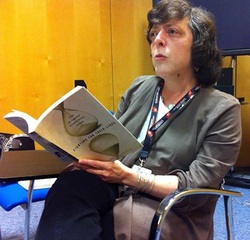Here is a podcast of the interview I did this morning with Bill Newman, host of The Bill Newman Show in Northampton, Mass. Bill is a thoughtful and well-prepared interviewer and his questions got at many of the core issues in Fighting for Their Lives. (My part of this show starts at about 16 minutes into the hour.)
 The 5th World Congress Against the Death Penalty in Madrid was an opportunity to meet capital defense attorneys who practice in many challenging locations, including Iran, China, and India. Many of the details differ, but I think the core emotional impact is the same. This photo shows me reading aloud from the book but doesn't show the many interesting conversations that I was able to have with capital defenders and human rights activists from around the world, as well as with other colleagues from the death penalty abolition movement. I was glad for the chance to see colleagues from the Quaker United Nations Office (QUNO), who have just released an important report called "Lightening the Load of the Parental Death Sentence on Children." I've very much valued the opportunity to assist QUNO a bit in this effort and hope their report is widely read. I’ve been thinking about a comment I received at a recent event where I was reading a short passage from Fighting for Their Lives. I read the scene in which one of the attorneys is having a final phone call with a client and is apologizing for not being able to stop the execution that is about to happen. The client responds, “It’s OK, son, you did your best.”
I often choose this scene as one of the few to read aloud at public events because it’s short and vivid, captures so many of the themes of the book, and people often respond powerfully to it. That was true this time as well. But as she was expressing to me how powerful she found the passage, a woman from the audience then said – referring to the client in the scene -- “I just have a feeling that guy was innocent.” He wasn’t, and I said so. I’ve been noticing as I speak about the book that people are often more familiar with the issue of possible innocence, and with lawyers who work to exonerate those who have been wrongfully convicted, than they are with other aspects of the death penalty and with the moral and personal questions that arise when the person facing execution is clearly guilty. With this particular scene and this particular audience member’s response, it struck me that perhaps it was exactly this display of humanity and caring on the part of the prisoner – his making an effort to comfort and reassure the attorney even though he himself was the one about to be killed – that led the listener to imagine that he must be innocent. It’s harder to make sense of the idea that a man could have been guilty of a terrible crime and also (many years later) capable of that particular compassionate exchange. Most of the clients referred to in Fighting for Their Lives were guilty. As I say in chapter 8, “These are not attorneys who focus primarily on trying to exonerate prisoners claiming innocence. … When they strive to prevent executions, they know they are more often than not fighting for the life of someone who did commit a terrible crime, someone whom a lot of other people consider monstrous and unworthy of help or care.” So what is that like? Well, that's longer than a blog post -- that took a whole book to answer. |
AuthorSusannah Sheffer is the author of several books and articles, most recently Fighting for Their Lives: Inside the Experience of Capital Defense Attorneys (Vanderbilt University Press, 2013) Archives
October 2013
Categories |
 RSS Feed
RSS Feed
